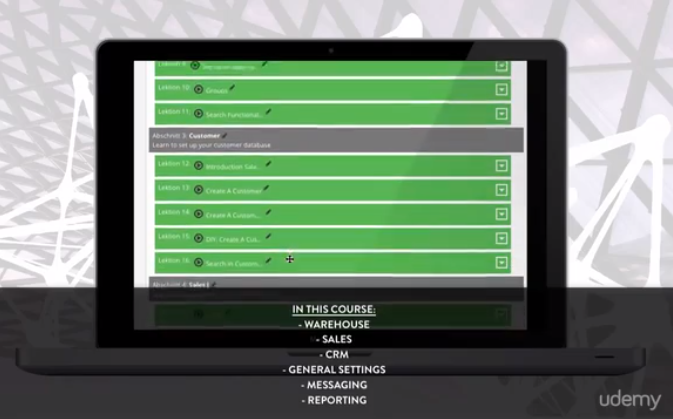Course Description
 Odoo (Open ERP) Basics
Odoo (Open ERP) Basics is a Udemy course designed to teach business owners and managers how to get the most out of this tool on a daily basis. An Enterprise Resource Planner (ERP) is used in organizations to manage all aspects of the business, and to deal with the growth smartly and efficiently. Odoo removes the need to use a lot of applications for an organization, as it combines their functionality into a single tool. Moreover, Odoo can be customized and tailored to meet the specific requirements of a company. Read our
Odoo Software .
The course has been designed for all levels, starting from the basics and going up from there. It is a comprehensive course with 70 lectures and 8 hours of content. Each lecture is kept short and precise, and delivers information on a specific subject. Once you are enrolled in the course, it is accessible forever. In addition, you get a 30-day money back guarantee, as well as a certificate on the completion of the course. It is available on Android and iOS as well so you can access it directly from your mobile device.

Course Price
$25

Student Requirements
The course is available to all levels of participants. Since the course is quite lengthy and extensive, it starts from the basics, but it covers everything related to Odoo, so you can skip to the lecture of your choice. At the end, you receive a completion certificate which can come in handy.
Course Objectives and Learnings
By the end of the
Odoo (Open ERP) Basics course, the student would have viewed 70 lectures and 8 hours of content. You will get a complete understanding of Odoo by the end, allowing you to not only work with the system on a daily basis but also to educate others about it. The course covers everything related to the tasks performed at a company, such as sales, warehousing, controlling, organization and administration.
Target Audience
The target audience for this course ranges from startups to large organizations, and everything in between. To be more precise, firstly, the target audience are the companies who already have Odoo installed, but need effective training and support for the employees. Secondly, it is for startups that grow quickly, in order to stabilize their business and make the transition smoother. Thirdly, it is for tech agencies who offer Odoo installations to other companies, in order to provide a better support and gain a complete understanding. Lastly, it is for the employees that work with Odoo ERP at a company, but have never had any formal training, or lack understanding of the tool.
Curriculum/Chapters
The
Odoo (Open ERP) Basics course is divided into 11 sections with 70 lectures. Section 1 is the introduction to the course, which involves a short description about Odoo, and how to setup a free test account. Section 2 contains 9 lectures regarding the basics of Odoo. Section 2 to 10 discusses the individual aspects of a business, such as customers, products, admins, warehouse, sales and price lists. Section 11 is the conclusive section, which deals with additional features of Odoo in summary.

Instructor

The instructor of the course is Patrick K√∂rting, a marketing and process architect. He started with the international music industry as a project manager, but later on chose marketing as his business. He was always trying to optimize processes from the early part of his career, which led him to start his own digital business consultancy. After being assigned to a project with a European agency with 10 employees to deploy ERP, he chose Odoo after careful consideration of requirements. He was fascinated with the power of Odoo, and today he works for the company while having the nickname ‘Mr. Odoo’.
s/Testimonials
Odoo (Open ERP) Basics has 121 enrolled students with an average rating of 4.3 from 8 reviews. 5 out of 8 people have rated it 5/5. Bernand Weinstein thought the instructor could have got to the point quicker, and that the course was not as comprehensive as it could have been.
On the other hand, Tim Sellmann enrolled into the course to determine whether Odoo was perfect for their business. In the end, he thought the course offered great insights and he was satisfied to chose Odoo for his business.
 Odoo (Open ERP) Basics is a Udemy course designed to teach business owners and managers how to get the most out of this tool on a daily basis. An Enterprise Resource Planner (ERP) is used in organizations to manage all aspects of the business, and to deal with the growth smartly and efficiently. Odoo removes the need to use a lot of applications for an organization, as it combines their functionality into a single tool. Moreover, Odoo can be customized and tailored to meet the specific requirements of a company. Read our Odoo Software .
The course has been designed for all levels, starting from the basics and going up from there. It is a comprehensive course with 70 lectures and 8 hours of content. Each lecture is kept short and precise, and delivers information on a specific subject. Once you are enrolled in the course, it is accessible forever. In addition, you get a 30-day money back guarantee, as well as a certificate on the completion of the course. It is available on Android and iOS as well so you can access it directly from your mobile device.
Odoo (Open ERP) Basics is a Udemy course designed to teach business owners and managers how to get the most out of this tool on a daily basis. An Enterprise Resource Planner (ERP) is used in organizations to manage all aspects of the business, and to deal with the growth smartly and efficiently. Odoo removes the need to use a lot of applications for an organization, as it combines their functionality into a single tool. Moreover, Odoo can be customized and tailored to meet the specific requirements of a company. Read our Odoo Software .
The course has been designed for all levels, starting from the basics and going up from there. It is a comprehensive course with 70 lectures and 8 hours of content. Each lecture is kept short and precise, and delivers information on a specific subject. Once you are enrolled in the course, it is accessible forever. In addition, you get a 30-day money back guarantee, as well as a certificate on the completion of the course. It is available on Android and iOS as well so you can access it directly from your mobile device.


 The instructor of the course is Patrick K√∂rting, a marketing and process architect. He started with the international music industry as a project manager, but later on chose marketing as his business. He was always trying to optimize processes from the early part of his career, which led him to start his own digital business consultancy. After being assigned to a project with a European agency with 10 employees to deploy ERP, he chose Odoo after careful consideration of requirements. He was fascinated with the power of Odoo, and today he works for the company while having the nickname ‘Mr. Odoo’.
The instructor of the course is Patrick K√∂rting, a marketing and process architect. He started with the international music industry as a project manager, but later on chose marketing as his business. He was always trying to optimize processes from the early part of his career, which led him to start his own digital business consultancy. After being assigned to a project with a European agency with 10 employees to deploy ERP, he chose Odoo after careful consideration of requirements. He was fascinated with the power of Odoo, and today he works for the company while having the nickname ‘Mr. Odoo’.





